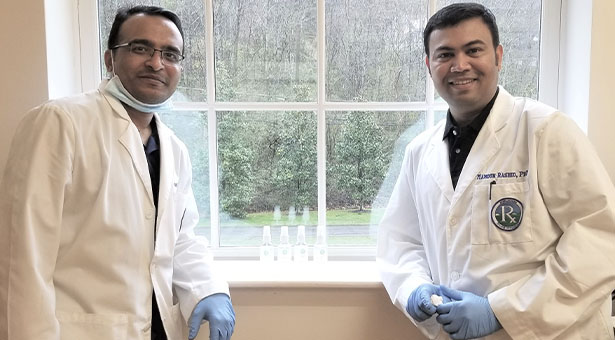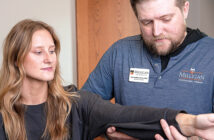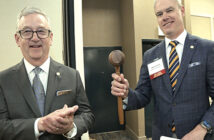Pictured Above: Dr. Faisal Hossain, left, and Dr. Mamoon Rashid with several bottles of the hand sanitizer now being produced at ACP
As the demand for hand sanitizer has grown and supplies of it have become almost non-existent as a result of the current Coronavirus (COVID-19) pandemic, the Appalachian College of Pharmacy (ACP) has ramped up its compounding lab and turned the lab’s focus to production of hand sanitizer.
The pharmacy school delivered its first shipment last week to Food City in an agreement it has to provide ACP-manufactured hand sanitizer for distribution to area Food City pharmacies as the demand for hand sanitizer continues. More will be delivered as additional raw materials to make it with are acquired and production continues in the coming weeks. Proceeds from the ACP agreement with Food City will be used to fund further research projects at ACP and for student scholarships.
“The idea to do this came up about two weeks ago,” Mayhew said. “It was a way we could help in the response to Coronavirus by helping to supply a valuable product needed to meet Centers for Disease Control guidelines related to hand washing and sanitizing to curb the spread of the virus.”
She recalled that prior to a planned meeting recently, ACP President Mickey McGlothlin had made a trip to Food City to purchase hand sanitizer to have at the meeting, but there was none to be found on the store shelves. He stopped at several other locations on his way back to the college for the meeting, but each place he stopped, they were out of it there as well.
“That spurred the thought for us about making it here on campus,” Mayhew said.
As the college moved to its current on-line course delivery for students, that left its compounding lab with free time. It also left some of the other college’s staff members with more time since they did not have students on campus with whom to interact. Add in some willing faculty time in the lab and the end result, Mayhew said was a decision to convert a portion of the current lab use to the production of hand sanitizer.
“We reached out to Food City to see if they were interested in our product since they have been such great partners with us on other college projects,” Mayhew said.
Earlier this month, ACP delivered some samples of its product — which is comprised primarily of 70 percent isopropyl alcohol and glycerin with a few other additives – and the rest, Mayhew added, is history.
Food City President and CEO Steve Smith said when McGlothlin contacted him about the pharmacy school’s ability to produce the hand sanitizer to assess Smith’s interest in offering it for sale in Food City’s stores, he didn’t hesitate to accept the offer.
“We told them we’ll take all you can make,” Smith said. “We’ve been out of hand sanitizer for days and have tried different avenues to get it without success. We received the first 50 bottles from ACP on Wednesday and they are selling well. As we receive more, we want to put it in all of our Food City pharmacy locations.”
Smith noted Food City has always had a great relationship with ACP and he added the grocery store chain has 20 or more ACP graduates who now work at Food City stores as pharmacists.
“This is a great service project for the college and I think it underscores the value the Appalachian College of Pharmacy has in education and in the community and what a great partner they are,” Smith said.
Mayhew noted that as ACP begins to ramp up production of the hand sanitizer, there are two issues – one being needed raw materials to produce it and the other being the bottles to package it in. Both issues are in the process of being resolved.
“We had some of the raw materials on hand, but have had to source the others through some of our contacts and we had to find the bottles as well,” she said.
The rest of the bottles needed to meet the initial order have been procured and are expected to arrive shortly. The sanitizer is being produced and packaged in eight-ounce and four-ounce bottles.
“A lot of people have been working really hard to make this happen,” Mayhew said, adding the college currently has plans to continue to produce the hand sanitizer even after the current crisis has ended.
“The credit for the manufacturing piece of this project goes to our ACP faculty members — Dr. Faisal Hossain and Dr. Mamoon Rashid and ACP Fellow, Dr. Mehbuba Rahman,” Mayhew said. “Staff members have also been helpful, pitching in when they have had time to share.
“Our Academic Success Coordinator Angie Mutter, Administrative Assistant/PICS Coordinator Wanda Vance and Information Technology Specialist Josh Snead have been so valuable in helping to get the bottles labeled, packaged and ready for delivery,” Mayhew continued. “ACP Faculty Member Dr. Shamly Abdelfattah, director of healthcare innovation, who is the college liaison with Food City, has been instrumental in this project as well.
“Sometimes, it just takes thinking outside the box to contribute to solving a problem,” Mayhew added. “ACP had the knowledge and the ability – and the space — to do this. Part of our mission is to make a difference in the community and this is one way we can assist — both during the current crisis and into the future.”




